The Germans Do GQ Magazine - Mesut Özil and Sami Khedira's Interviews, Pics, Videos & Gifs
The Germans Do GQ Magazine -
Mesut Özil and Sami Khedira's Interviews;
Pics, Videos & Gifs
This post contains both interviews, fully translated, with accompanying pictures, gifs, and photographs.
Interview & Feature translations were done by jenny_jenkins
Video Translations were done by sashatwen and jenny_jenkins
Magazine Article scans were provided by soccergirl63
All Gifs and Pictures were created or downloaded by andriy_7
.
Mesut Özil: His Year.
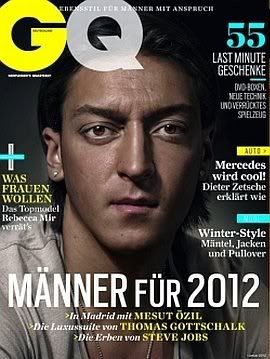
In 2012 a boy from Gelsenkirchen is supposed to make us happy. Mesut Özil carries the weight of expectation.
Feature Article published in GQ
December, 2011
X-Posted from crinkly_ears

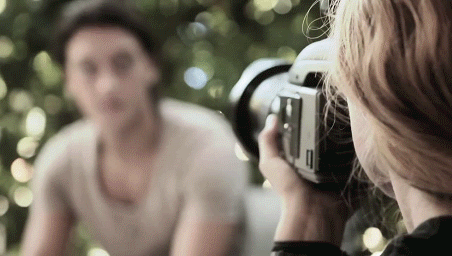
Mesut Özil's cage lies partially shaded, and from far above everything looks quiet and peaceful as though it were a rest-home for battered pitch-grass. It is a typical Autumn day in Madrid. Blue sky. 25 degrees. Two men, as small as figurines belonging to a model train set, control the long metal arms attached to heat lamps that throw an orange light along the ground where the sun's rays cannot reach. The only other sound is the murmur of tourists who wander through the blue and white stands as though they are in a museum, gazing straight down in awe. At the weekend, they will have gone, along with the lamps and the grounds-keeper. Instead, 80 000 people with the expectations of an opera audience will be sitting in the stands. At Real Madrid it's never just about winning but about the aesthetics of the game.
Small wonder then that Mesut Özil's public have taken him into their hearts from the first moment. The 23 year old does things with the ball - so lightly and elegantly - like an aria by Mozart. He is no runner, no strategist, and no fighter. He is a player. It was like that before, when he practiced his art on the red sand in the football enclosure surrounded by wire fence in Gelsenkirchen. It's like that now, where he's come into his own in the holy of holies of football: the Santiago Bernabeu Stadium. After one of his first outings the sports paper Marca" wrote: "Özil uplifts the Bernabeu." His new cage.**
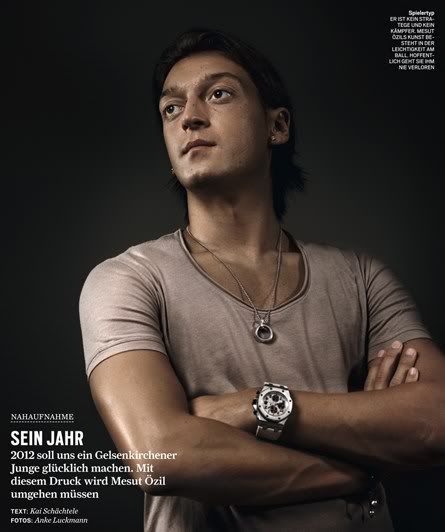
The Second Year Is Always The Hardest
In the meantime, Özil's world has divided into two. In his first year in Spain he managed to make himself an undisputed starter. As directer of the German National Team he received - most recently in the game against the Netherlands in November - unbelievable reviews. In Madrid however, he's felt in recent weeks the curse of the truly gifted: from hangers-on there is no forgiveness. "Özil did nothing during the whole match" complained As after his performance against Valencia. The second year, they say, is always the hardest. That seems to be true at Real Madrid. Özil's relationship with Real Madrid could go either way. He could conquer all of Europe. Or he could lose his place in the cage. Özil is aware that the first year of his new life was only the overture. "I've shown what I can do and what potential I have. But it does not matter. I need to continue improving, and I work hard at it."
He is sitting in front of a cup of coffee on the terrace of the Villa Magna hotel not ten minutes distance from the stadium, the heat-lamps and the whispering fans. The morning practice has just ended and his freshly washed hair smells of fruit: something between strawberries and melons. All the photographs for this story are shot. As he is discussing his first year and a half at Madrid he still gushes about it: the football mania of the Madridistas, the way fans stop him on the street and talk at him at such a rapid-fire pace he can't understand a word until eventually everyone just laughs. And again and again - the stadium. "To play in the Bernabeu is an indescribable feeling. I can still remember my first outing," he says. "A friendly match in August. I had heard a great deal about the atmosphere but when I stood before this wonderful audience I was covered in goose-bumps. I felt as though I was in a dream."


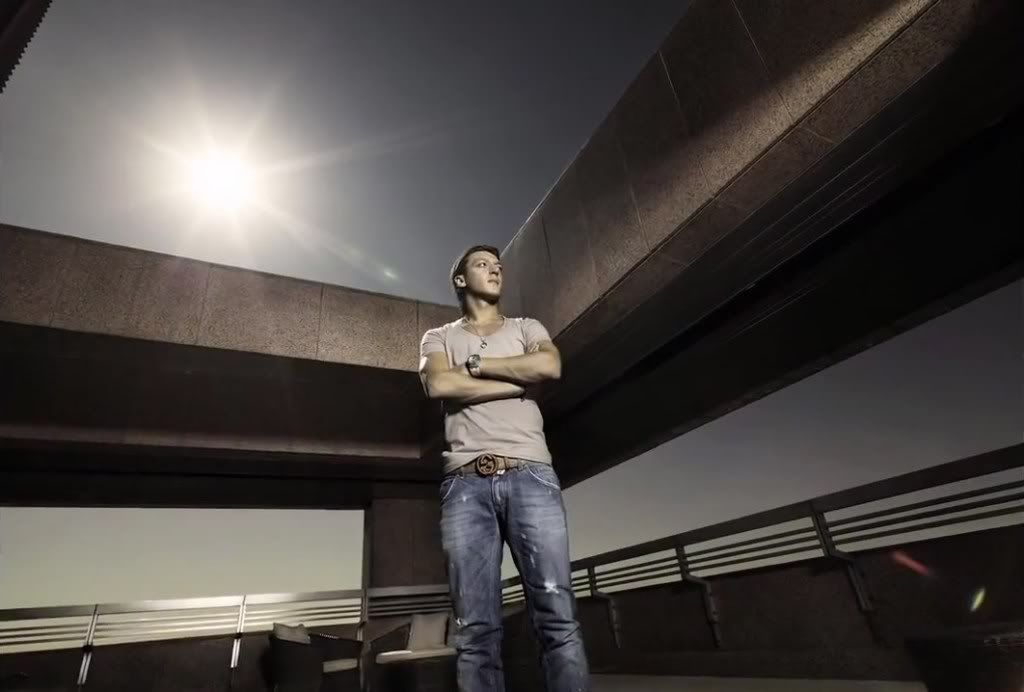
Witty And Superior Performances
Entirely unimpressed by the setting or its expectations, or the glorious history of a club that may no longer be the best in the world but is certainly the most glamorous, or by the fact that in Madrid he is under the continuous gaze of multiple sports dailies, he quickly becomes a central figure in the Madrid concert. He stands on a stage with the Portuguese Cristiano Ronaldo and is well on his way to having what he said he wanted in an interview with GQ in autumn of 2010: "I want to be one of the best footballers in the world."
The World Championship in South Africa had just ended, where he had provided some outstanding performances and had become partially answerable for the idea that German football now represented something cool and witty instead of mere strong-arm tactics or endurance. At the time, no one knew if the team would be able to maintain this level over a longer period of time. Today we know they can, and it is also to Özil's credit in some ways that the German National Team has managed something no other team has ever managed before: they won 10 out of 10 qualifying matches. In 9 of these matches, Özil was a starter, slicing apart opposition defences with his precise passing, scoring five goals himself. Since then the question has changed: could it be this team is as good as the best Germany ever produced - the legendary team of 1972 that, led by Guenter Netzer, won the European Championship?
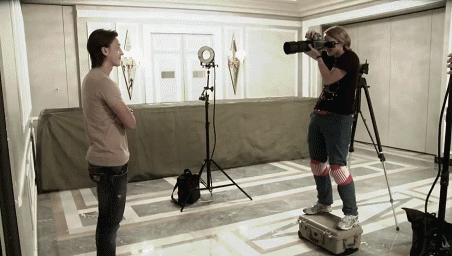
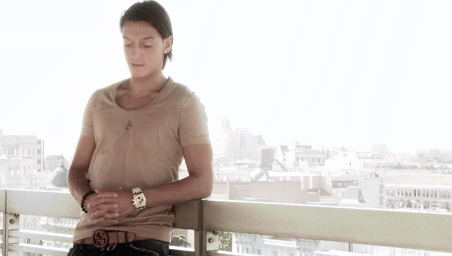
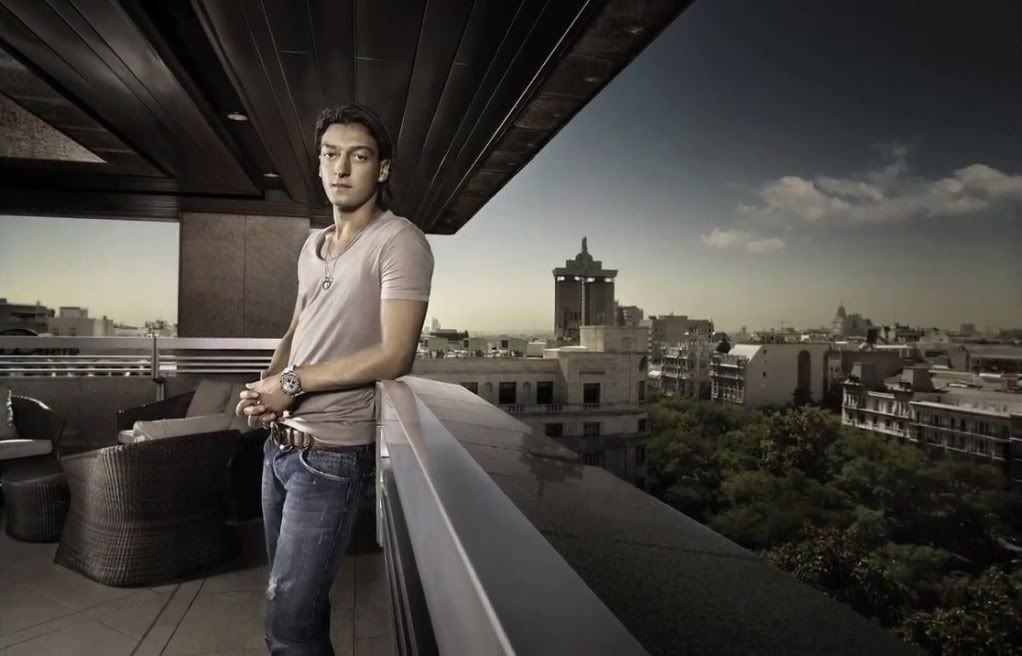
"We will be European Champions"
Özil is convinced that the team is ready for a title 40 years later. "We learned a great deal from our loss to Spain in the World Cup semi-final. Since then we have not lost a game. I believe in this team. We are attuned to one another on the pitch and we can beat anyone." It would be the fourth European title after 1972, 1980 and 1996. Only this time it wouldn't only be a sporting triumph. It would be the first title from a team that no longer has its roots solely in Saxony or Swabia, but also in Turkey and Tunisia. Özil, whose grandfather arrived in Gelsenkirchen from the small village of Hisiroglu would be one of its faces.
To lift the trophy in Kiev on July 1 - perhaps after a final involving Iker Casillas or Sergio Ramos, his colleagues at Madrid - it would be as though the moment had been made for him. It would mark the end of his metamorphosis from a super-talent, who was often criticized for his inconsistencies at Schalke or Werder Bremen, to world star. Sometimes Özil and Sami Khedira sit after practice with Casillas and Ramos in the locker-room. The goal-keeper and the defensive player are two stalwarts of the team that has twice in the last two tournaments stopped Germany - from winning the title in 2008 and from getting to the final two years later. They are no longer certain they'll manage it a third time. "They're always coming up to us and showing us photographs of the trophy," explains Özil. "We always respond the same way. 'We will be European Champions - you know it yourselves.' And then we all laugh." Until the European Championships get underway in Poland and Ukraine there are several more months during which all must stay focused on the present. The city is thirsting after a big title. That Barcelona has won all the big trophies in recent times still hurts.



From Highs To Lows
It's at this moment - when the team is trying to quench that thirst - that Özil is threatened with the loss of his coach's support. Mourinho is like a father, says Özil, but for the first time he has to deal with the fact that this is a father who punishes by withdrawing affection. "Özil is a brilliant player. Every time he gets the ball he does fantastic things with it," Mourinho says. "But now he has to reach the next level. Last season his performance was better. We need more from him." Özil watches from the bench as Kaka takes his place. Marca writes: "One can see that Özil is not in a good place" and hails Kaka as "one of three players" with an assured starting place. From highs to lows - at Real, things happen quickly. It's the first dip he's experienced at Madrid. Though one doesn't get the impression that he's losing his insouciance. "I can't always give a perfect performance. I am only human. Sometimes it works, sometimes it does not." He ends the meeting with a polite farewell, gets behind the wheel of his car, and drives away. Anyone who has learned to play soccer in a cage knows full well that many things are allowed while only one is forbidden: giving up.

The Video - GQ Meets Mesut Ozil
(Alternative Title: How To Try And Fail To Photoshop The Welpenschutz* Out Of Mesut Ozil)
At the beginning you think you're in a dream, because so many world-class players all play in the same club - Cristiano Ronaldo, Kaka, or Casillas, Ramos - and the first time I came into the locker room I was naturally a little nervous. But after a while it works out because everyone is so friendly, and they help me, naturally, a great deal and I'm just proud to be allowed to play at Madrid.
Naturally the atmosphere in Schalke or Bremen is just as nice, but in the Bernabeu the atmosphere is really something else. They are madder about football, if I can put it that way and...
...it doesn't matter where we land. Thousand of fans are waiting for us in the airport. I'd never seen anything like it.
The team has become much younger, there are lots of young players who really have a lot of potential and you can see that. It doesn't matter if someone is missing, another player can step in and do the job. We are very attuned to each other when we play, we are hungry for success, it's a young team that wants to win titles.
Well, my ambition is to win titles and to become one of the best players in the world and I work very hard on myself so that I can fulfill all my wishes.
________________________________________________________________________
**A reference to the now famous "monkey-cage" - the wire-fence enclosed space where Özil learned to play football.
*For full details on the German term Welpenschutz and how it applies to Mesut Özil - HERE is an explanation.
.
.
"There's Nothing Perfect About Our Relationship. It's Really All Quite Normal"
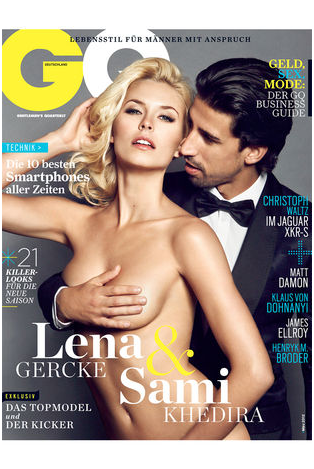
Interview with Lena Gercke, Sami Khedira
GQ Magazine.
February, 2012
X-Posted from sami_khedira
The photographer calls out: "Pay Attention, it's time!" But Lena and Sami don't care about him. They go on kissing and cuddling as though he isn't there, as though the 15 other people aren't there either, as though in the whole wide world it's just the two of them.


Dearest Lena, dearest Sami, unfortunately we are going to start off with a smarmy tabloid-newspaper sort of question. How do you become such a perfect couple?
Lena Gercke: I don't think we're perfect. We have a very nice, but very normal relationship. Happily that is what we were both looking for.
The boulevard press calls you the German Beckhams, but until now you have avoided being open about it. Why is that?
Sami Khedira: We are both open people and were clear from the beginning that we'd have to deal with it. On the other hand the beginning of a relationship is a delicate phase that we didn't want to risk. We didn't want to share with everyone.
Lena: Besides that there's nothing to reveal. As we said, there's nothing spectacular about it. We met through aquaintances, fell in love, 'that's it'.

Sami, you are normally in Madrid. Lena has to jet around for work. Does one require something special for this type of long-distance relationship?
Sami: If both of us want something, then it works out. Of course it's different when you work in the same city and meet up in the evenings on the sofa. But if you want something from the heart, then it works out. I think it's a lovely thing, when we don't see each other for a week and look forward to the moment when we are together again.
Lena: We do thing ordinary couples do too. Sometimes [when we are out] people want Sami's photograph but that's to be expected. I have my house in Berlin and another in New York. I needed, after the helter-skelter of the past few years a home-base where I can unwind. And that is here with Sami in Madrid. We live rather quietly when I come here because I have no interest in going out, just being together.

What does it mean to you that Lena is no typical player's wife - that she already has her own very successful career.
Sami: We were equals from the beginning. Both understood some of the complications of the other's life. For example - that kids do sometimes follow me around and want their shirts signed.
Is there fall-out when one of you gives autographs and the other isn't asked?
Lena: Our relationship isn't a competition in giving out autographs. That would be absurd. It would also be rather sobering in Germany, for me, if it was.
Sami: It also goes the other way around, that Lena is in the spotlight and I'm the one who's asked to take photographs.

You have both followed your goals very ambitiously. Sami was an elite athlete, Lena tried out in one competition after another.
Sami: Today it can't be any other way. You have to have a clear idea of what you want early on and then work for it. If you want to be one of the best then you have to take initiative and not chatter on about it too much. You have to plan it all yourself, and also that you have fun at it.
Lena: I had no plan to become a model. I took part in two castings, but didn't count on having a chance. I thought it was funny. I didn't believe it could happen.
You both talk a great deal about performance, overcoming obstacles, ambitiousness. Why are these qualities considered objectionable by so many people?
Lena: We are both very self-critical and expect a great deal. Perhaps it has to do with the fact that we sought these things out ourselves.
Sami: If you want to be at the highest level then one must take criticism as it comes. Talent is nothing without self-discipline.
Lena: I'm not very disciplined.
Sami: You are, definitely.
Lena: In my job maybe, privately not.
Sami: Everyone has their weaknesses and everyone needs their time off. But when it comes to one's job it has to work out. I first realized, through Lena, that it was like that in other professions too.

How do you cope with the often harsh criticism? When a German cabinet minister, for example, ridicules his press-spokesman in public he has to apologize. The tone with which Heidi Klum criticized you, for example, was extremely harsh. And the press, when it criticizes Sami, is even harsher.
Sami: I have a very thick skin. Occasionally though I do sit in front of a newspaper article and wonder to myself why they bother going to such lengths. But one must never forget: we live in a very public world. And in football, emotions play a huge role and one must consider that these things are written for effect.
Lena: I marched into "Germany's Next Topmodel" quite unprepared and didn't think about it much. The critique I had to put up with [from moderator Heidi Klum] was never anything I took personally. Sometimes I wonder why the press would be so unfair sometimes. There's little concern over the individual. I try to consider it psychologically - that so much interest is taken in our failures.
Do you criticize yourselves?
Sami: I can say absolutely that we trust each other 100%. We can talk about anything at all - even things that might be uncomfortable.
Lena: I've been away from my family for years, always travelling alone. Naturally Sami is the most important person I talk to. Nearness and trust are the most important things.

Sami, you are one of those football players who actively fights back against criticism. Is it something in your masculinity that causes you to resist swallowing it? [This is a reference to a press conference Sami called in October and an interview he gave a day later when he was with the National Team during which he hit back at the German media for "lacking respect"]
Sami: As a man perhaps, but above all as a person. If someone brings someone else down simply to make the newspapers then I don't like it. I give very few interivews. When I do it is because I have something to say.
With Mesut Özil or David Odonkor there's constantly a discussion about integration in the background. How is it with you Sami? Does your Tunisian background influence you?
Sami: Sometimes I was eyed critically, because I didn't look typically German. But we identified from the beginning as entirely German - my entire family. Discipline, punctuality - these were grounded into me as values. My father in particular put a great weight on these things. I think it is important to make an effort to fit into the environment you have chosen to live in. And not just to do your own thing. It was a good school for me to experience these things. I understand how to appreciate small things - but we're both like that.
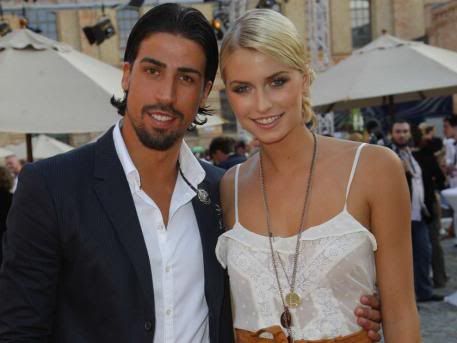
In Berlin, summer 2011
A successful footballer and a model have something in common: they earn a great deal of money at a very young age. How difficult is it to resist buying 5 Ferraris at once?
Lena: Not in the least bit difficult. I was brought up to be thrifty and Sami was too. We have that in common.
Sami: I always knew how much I was earning, how much I had, and how much I needed. One shouldn't be too critical of someone who buys a Ferrari when he can afford it. The relationships between these things simply have to work out.
How did you experience the revolution in Tunisia from a distance?
Sami: I was very moved by it. I often asked my father what was going on, most especially in his old neighbourhood. Unfortunately there were many tragedies. People that we knew lost a great deal, some of them their lives. When we were last there on a visit it was still nice though to see how people were enjoying their freedom.
Lena: We were there together. It made a huge impression: the happiness and thankfulness with which people were experiencing it.
You live and work in different countries at the same time. What can you learn about Europe - or our continent?
Sami: That one must respect other mentalities and that one has to adjust to them. These are simple truths that you simply learn - that one can be at home anywhere. For me it was curious that it was in Madrid that I first became aware of my "German virtues". Mesut Özil and I are "the Germans". The Spanish are the way they are. One has to accept it. They appreciate our virtues in our work a great deal, but when you have an appointment with a Spaniard at half past seven then it really means half past nine. Half an hour late, that's really very punctual here.

At a skating-gala this past November.
You both represent Germany abroad in different ways. How do you perceive the role the country has taken. What reactions do you get personally.
Lena: To be quite honest, it's not a theme in my business. I work every day with people from all over the place and where they are from doesn't play a role.
Sami: The picture that we as a national team have shown to the world has changed entirely. We were always seen as hard (Wir galten frueher immer als Holzer), in the meantime we've come to represent other things. We also represent a picture of a multi-cultural Germany and that is noticed. There was only one difficult moment during a national team trip to Israel when we were greeted by children with a Nazi salute. In that moment one feels thoughtful, even as a German with an immigrant background.
Finally - one more smarmy boulevard-press question. How is your relationship going to develop. Do you have plans?
Sami: We've been together for a year and everything is wonderful.
Lena: We're young, we're happy to have each other. Plans are unnecessary.
GQ Meets Up With Sami Khedira & Lena Gercke
.

Mesut is ready for his close-up!
.